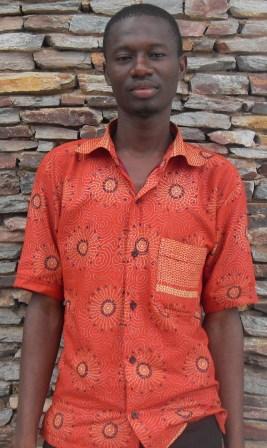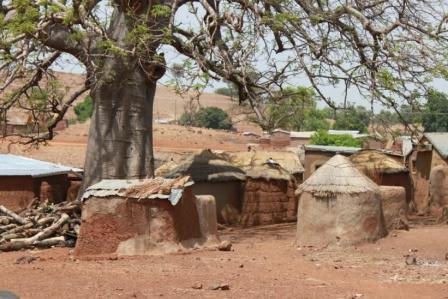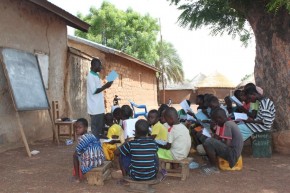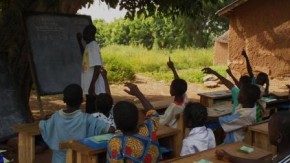
Abubakari Sulemana Hafiz has a lot to be proud of. He is one of 11 undergraduates who are part of Ghana's first cohort of veterinary science students at the University of Ghana. This achievement is even more impressive as until he was 14 years old, he had not been to school. Abubakari comes from Kumbungu district in Ghana's northern region where many families simply cannot afford the opportunity costs of sending their children to school. While Ghana has been experiencing high growth rates, the north has been left behind - over the past decade the number of poor declined by 2.5 million in the south while it grew by 0.9 million in areas in the north. Abubakari explains that his story is common.
"Children are kept out of school so they can work to help support their families – selling goods at the market, doing manual labour on the farms, or rearing cattle."
Until School for Life came to Abubakari's village in 1999, he was living with his cousin and looking after their farm. School for Life is a NGO that provides an accelerated learning programme for out-of-school children, known as complementary basic education. Students attend three-hour classes, 5 days a week for 9 months, taught in their mother-tongue language. Founded in 1995, School for Life has been very successful at getting out-of-school children into school. Part of their success centres around the strong community involvement. School for Life offers communities the chance to run the 9-month programme, by appointing community members to form a school management committee.
"In every community where we start School for Life, we hold a large discussion forum where we explain what we do. If the community wants to start a programme, they go onto elect a committee of 3 women and 2 men who oversee the programme," the deputy manager, Mr Braimah explains.
School for Life deliberately seeks to get women to take a leading role on the committee, and ensures that over 50% of the out-of-school children who enrol are girls. This is because more than half of girls in these communities are not in school (see my earlier blog post on our partnership with Camfed).

The committee is then tasked with ensuring that the children who signed up attend the classes, parents are kept informed of their children's progress and the community gains a stronger understanding of the value of education. The strong linkage with the community does not stop there. The teachers, known as facilitators, are also recruited from the same communities in which they teach. The community has to appoint a facilitator who is trained by School for Life to teach the class and commits to personally ensuring that all the enrolled children attend.
The founder of School for Life, Mr Saaka, explains that the success of the programme very much stems from the fact that communities trust the people running the programme.
"Having a facilitator from the community, promotes high retention rates, excellent attendance, and quality engagement with parents and the community. The facilitator will go around to an individual family's house if their child is not coming to the classes. There is also flexible school timetabling that allows children to support their family's need to earn an income during the morning."
School for Life has really worked to reduce the number of out-of-school children, currently at around, 500,000. From 1998 to 2007, it educated more than 85,000 children aged between 8 and 14. More than 90% of these students graduated from the program, and around 70% were integrated into the formal school system. In 2006, a 2 -3% increase in the national enrolment rate was attributed to the School for Life programme.
Abubakari commends School for Life and the Ghana Education Service's close partnership to enable graduates to transition to regular school on completing the programme. Usually graduates enter into class 4 of primary school.
"Straight after, I went to Kumbungu primary school. My teacher knew that I was a School for Life graduate and really supported me to improve my English skills, and recognised that I enjoyed Maths. She was the one who pushed me to enter into the northern region's Science and Maths competition where I came first. That really gave me the confidence to continue my education and go onto to senior high school, and become the first person in my family to go to university."

DFID Ghana first started supporting School for Life in 2008. Since then, we have supported 38,000 out-of-school children to go through this second-chance learning programme. Based on the strong results, DFID Ghana is now supporting a scale-up of complementary basic education to reach 120,000 out-of-school children by replicating the School for Life model and partnering with other NGO-providers.
In addition to providing access, the programme will support the Government of Ghana to move the out-of-school agenda forward. The Chief Director (most senior civil servant in the Ministry of Education) Enoch Kobbinah, will chair the taskforce on complementary basic education. DFID will help strengthen the government's ability to procure complementary basic education programmes through non-state providers and provide advice on the draft policy. We have also provided support to refine the existing package of government-approved teaching and learning materials. The well-known Indian NGO, Pratham has been sharing ideas and collaborating with School for Life to improve the teaching and learning materials. There will also be a large research strand to the programme: a longitudinal study will be carried out to track the out-of-school children supported over a ten-year period. The study will fill in the evidence gap on out-of-school children looking, assessing how much they learn and the longer-term value for money of complementary basic education programmes.

For Abubakari there is no doubt that School for Life's complementary basic education programme has changed his life.
"It is hard to believe that I am now living in the capital, and studying veterinary science. I really hope to be able to help increase Ghana's agricultural productivity, so we can grow more and do that more efficiently, and rear healthier animals. This will also help poor families, like mine, to be able to send their children to school."

4 comments
Comment by Abubakari Sulemana Hafiz posted on
Truly, School for life has really changed the life's of many of whom I am not an exclusion, but does not to say nothing needs to be done again. There are still thousands of out-of-school children in the country. So philanthropic organizations, government and other interested parties should team up with school for life to give those children life. Also, we will do our best as products of school for life because to whom much is given, much is expected. The only thing is, we are seeking the enabling environment and the needed support which I know for sure readers of this post will not hesitate to offer us that support. Thank you for reading. May God richly reward you.
Comment by Karimu Alhassan Mohammed posted on
Few comments:
The 7th paragraph which starts with "The founder..........." should be reframed to read "The Programme Manager of School for Life......".
Comment by Lawrencia Dakurah-Abakisi posted on
Great story about Hafiz and the collaborative efforts between Government , CSOs and Development Partners.
I am looking forward to the up scale of the complemtary basic education programme which will give opportunity to many more children like Hafiz to realise their potential and contribute meaningfully to nation building.
Comment by Ibrahim Abdul-Hanan posted on
I feel proud to be part of the School for Life team that has brought about this success story. To all those who wonder what school for life does, well this story tells it all; turning around the dark side of life of the numerous out of school children into one of a brighter hope through mother tongue functional literacy classes and sensitization.